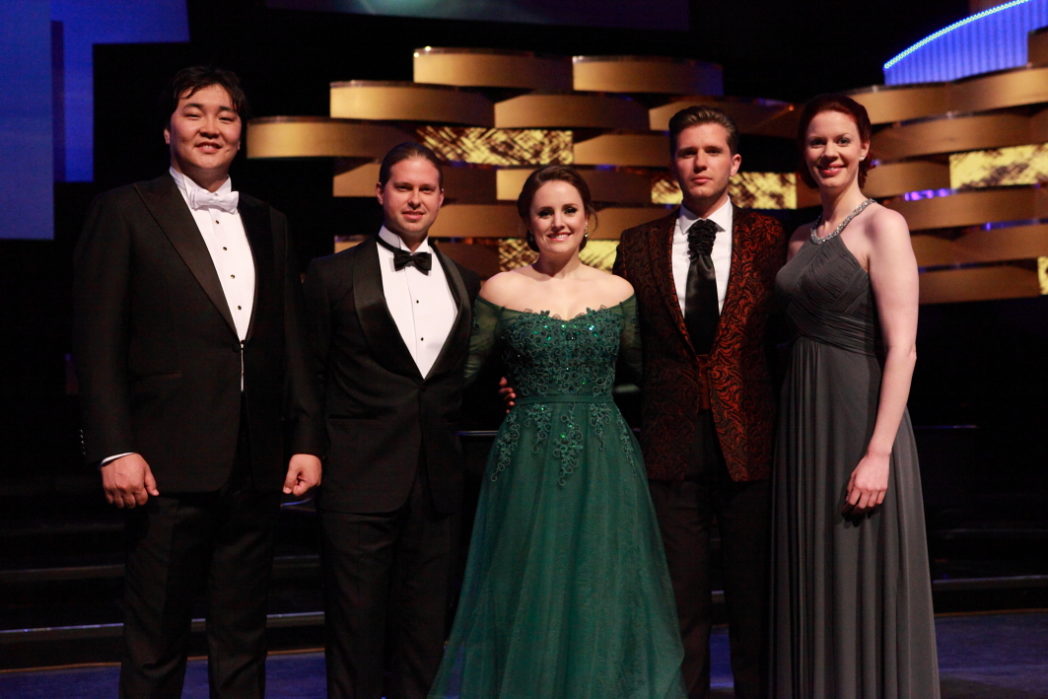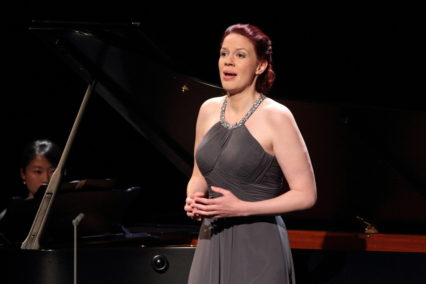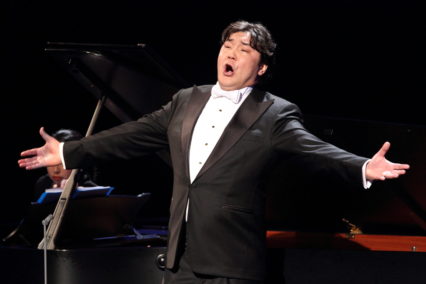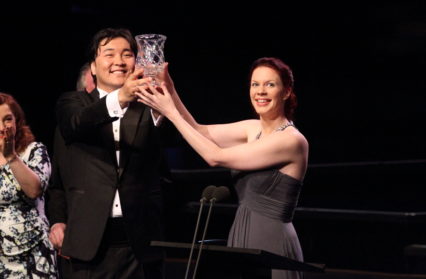Cath Barton was at Cardiff’s St David’s Hall for the final rounds of the biennial Cardiff Singer of the World song Prize, featuring Ariunbaatar Ganbaatar, John Chest, Louise Alder, Iurii Samoilov, and Catriona Morison.
As the audience sang the Welsh National Anthem at the end of the evening’s proceedings, the assembled competitors and jury members on the stage looked, for a moment, like a parody of the scene from Britten’s Albert Herring when the crowning of the Queen of the May is not what anyone expected. Was it just that the sound from the audience was a surprise to some of those on stage, not used to being the recipients of the volume and intensity of singing that a St David’s Hall audience can deliver? Or was there a sense of shock about the result of the competition?
All those selected for final rounds of the biennial Cardiff Singer of the World Competition may choose to take part in the parallel Song Prize competition. The juries for the two competitions have some members in common. This year the Song Prize jury had three new members: American opera diva Grace Bumbry and the singers Wolfgang Holzmair and Ailish Tynan – the latter a former winner of this Song Prize herself –joined established director of Wigmore Hall John Gilhooly and opera director and Chair of the jury David Pountney. How the jury reached its decisions is of course something about which we can all only speculate, but hints were dropped by the Chairman that they were not all of one mind when the line-up for the Song Prize Final was announced at the end of the heats earlier in the week.

All but one of the 20 competitors who came to Cardiff for the main competition this year also entered the Song Prize competition. The need to prepare a separate 20-minute programme, and additional material in case they go through to the final, means that this is certainly not something undertaken lightly. For competitors the potential rewards are not just financial but the opening of other doors in their careers alongside the opera-casting opportunities offered in response to their performance in the main competition. For the jury – and the audiences – the Song Prize shows, or should do, what singers can do when they are not hiding behind an operatic role. The Song Prize rounds take place in the intimate setting of the Royal Welsh College of Music and Drama’s 450-seat Dora Stoutzker Hall. The final is in the 2,000-seater St David’s Hall, where the challenge to the singers – with only piano accompaniment, unlike the main prize finalists who sing with full orchestra – is to replicate the intimate experience of the recital hall.

What qualities does a successful song singer need? Certainly voice, that is to say the natural instrument given to the individual, and which he or she develops technically during their training, is one. But only one. Add to that the ability to lend appropriate colour and weight to different repertoire and, crucially, to communicate the meaning of a song to the audience, which the finest singers can do even if their listeners do not understand the language in which they are singing. Without doubt all five finalists had demonstrated these abilities in the programmes which they sang in the Song Prize heats this weeks. How did they cope with the added pressures of the final in the larger hall and under increased media scrutiny and audience expectation?
Before going on to consider the individual singers I must acknowledge the huge contribution made by the pianists. The official accompanists, Llŷr Williams and Simon Lepper, are without parallel in their sensitivity to singers, though clearly when a singer has a regular partnership with a pianist that should reap its own rewards.
The first to sing was baritone John Chest from the USA (here with his own pianist, Marcelo Amarel), who had sung songs from Schumann’s Dichterliebe alongside Duparc and Copland to great effect in his heat. In an all-new programme of Schubert, Brahms and Richard Strauss songs he demonstrated his technical command of this core lieder repertoire. On another night Chest’s risk in opening with Schubert’s hushed Nacht und Träume might have succeeded in drawing his listeners in, but on this occasion, good as his exposed legato line was, he felt to me detached. Perhaps it was nerves that got the better of him as over-control and angst seemed to prevail in his programme even where, as in the Strauss lied, Heimliche Aufforderung, the words suggest an optimistic mood.
Scottish mezzo Catriona Morison (pianist, Llŷr Williams) presented an adventurous and varied programme. Her opener, two songs from Schoenberg’s Das Buch der Hängenden Gärten, was daring. This is uncompromising music but Morison, singing with engagement and passion, captivated her audience from the start. In lieder by Korngold, Brahms and Grieg she demonstrated her expressive range, but for me the highlight of her programme came in two miniatures from Pierre Vellones, a little-known – but fascinating! – French composer who lived the early twentieth century. In the first of these two extracts from his Cinq épitaphes Morison made us laugh with her characterisation. This was specific, exquisite communication.
Iurii Samoilov from the Ukriane has a light but rich baritone voice (pianist, Simon Lepper). He stayed well within his comfort zone, repeating much of the repertoire which he had sung in his heat, and merely adding two songs by Verdi. Samoilov nonetheless proved himself an engaging singer, wooing his audience with a swagger in the Tchaikovsky’s Don Juan’s Serenade. He demonstrated his ability to draw his listeners in with some lovely moments of soft singing in songs by Rachmaninov, particularly in Yesterday we met. For me, though, he was one-dimensional, and the whole programme was a welter of Romanticism. I found myself wanting him to take off his nice brocade jacket, fling it over his shoulder and sing a louche cabaret song!
I admit that, going into this Song Prize Final, my favourite was the English soprano Louise Alder (here with her own pianist, Gary Matthewman), and I know I was not alone in that view. She is a singer of tremendous poise and a first-class communicator. Perhaps her opening song, Schubert’s Die Forelle, was a little too safe, but her performances of two of the same songs which John Chest had sung – Nacht und Träume and Heimliche Aufforderung – took us on an emotional journey in each case. Liszt’s Pace non trovo showed Alder’s ability to handle a substantial concert aria, but for me the glory of her programme was the wonderfully contrasting pair of songs by Poulenc – the epitome of nostalgia that is C and the fast and furious words of Fêtes galantes.

Unlike the other singers in this Song Prize Final, baritone Ariunbaatar Ganbaatar (pianist, Llŷr Williams) has not had the opportunities afforded to young professional singers by the wealth of opera companies in Germany. Without question he has a voice of rare quality, but he has not yet learnt how to rein it in and give songs written for the concert hall the tone colours and subtlety which they demand. The first song in his programme, Schubert’s Ständchen, should be a seductive serenade, but he delivered it as a bombast. Similarly, I felt that Ganbaatar’s performance of Fauré’s Après un rêve – for all that his French was good – lacked real understanding of the text. In stark contrast, when he sang in his own language and an idiom in which he is completely at home in Sharav’s The Steppes of Mongolia, he showed in stunning style how he could deliver a song.
When the jury came to the stage after their deliberations, David Pountney revealed that, as they were divided and unable to agree on a single winner, there would be two, Catriona Morison and Ariunbaatar Ganbaatar. The news was received with gasps of surprise from the audience, but also, after people had had the chance to digest this news, with favourable reactions from many. I do not quibble with the reasons for either of these talented singers being awarded a winner’s prize, but those reasons must be so very different that the jury had clearly not agreed on criteria for judging, and this does entrants for the Cardiff Singer of the World Song Prize in future years a disservice. That said, both these winners have enormous potential for successful careers, and the world of music is certainly the richer for that.
BBC Cardiff Singer of the World Song Prize
St David’s Hall, Cardiff, 16 June 2017
Ariunbaatar Ganbaatar (baritone, 29, Mongolia)
Iurii Samoilov (baritone, 28, Ukraine)
John Chest (baritone, 31, USA)
Catriona Morison (mezzo-soprano, 31, Scotland)
Louise Alder (soprano, 30, England)
Pianists: Llŷr Williams, Simon Lepper, Marcelo Amarel, Gary Matthewman
Jury: David Pountney (Chair)/ Grace Bumbry/ Wolfgang Holzmair/ John Gilhooly/ Ailish Tynan
Header photo of joint winners of the BBC Cardiff Singer of the World Song Prize, Ariunbaatar Ganbaatar and Catriona Morison, by Brian Tarr



 Enjoyed this article? Support our writers directly by buying them a coffee and clicking this link.
Enjoyed this article? Support our writers directly by buying them a coffee and clicking this link.







